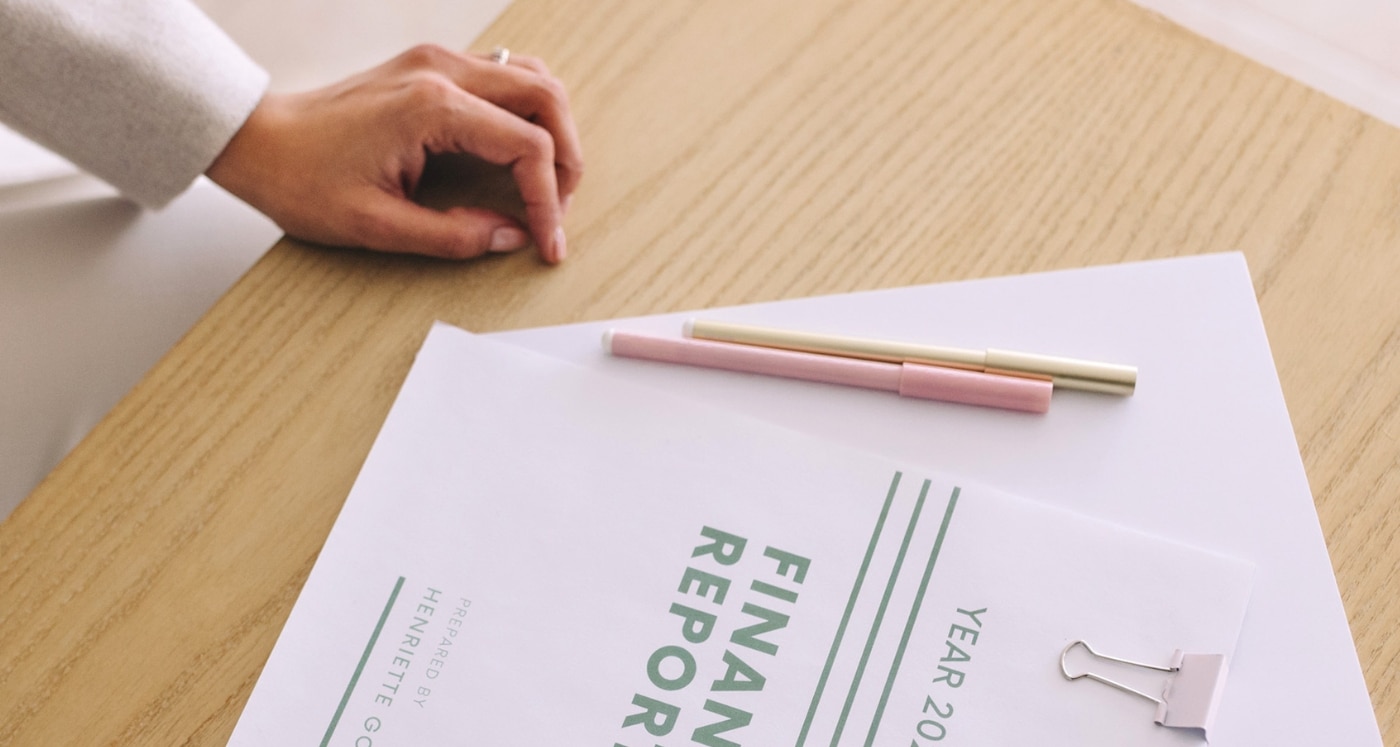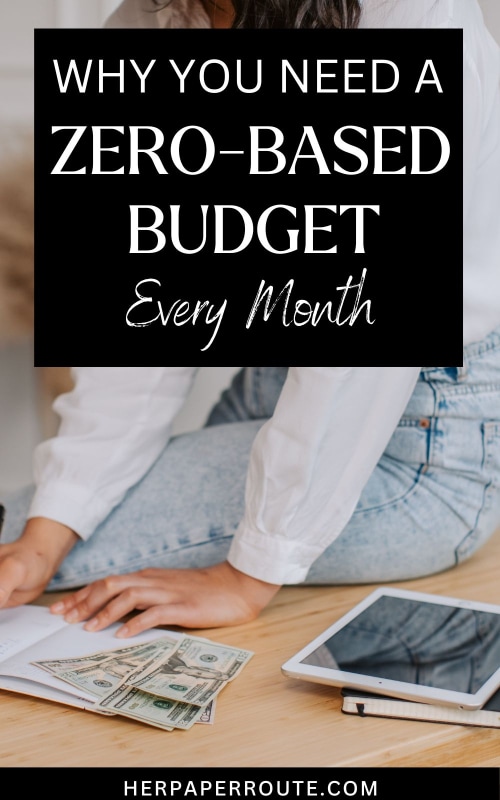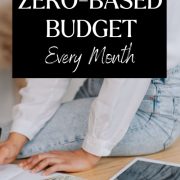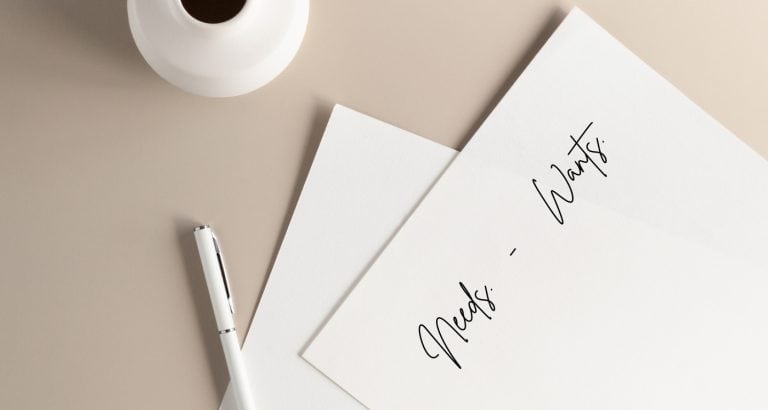Why is it Important to Write a Zero-Based Budget Every Month?

If you are asking ‘why is it important to write a zero-based budget every month?’ The answer is simple. Creating a zero-based budget helps you to have complete control of your money.
You’ll know where every penny is going, which means you are free to save and spend amazingly. You can decide what amounts go to what categories, and it helps you to stay focused.
As an affiliate partner of various brands and sponsored content, HerPaperRoute may earn commission on qualifying purchases. Disclaimer
A zero-based budget is a way to simplify. Although it may take a little time to create it and get it working the way you want, it’s a good system that ensures you’re using your money the way you decide.
And it helps you to remain consistent, which allows your cash to grow more effectively. Read on to understand how to write a monthly zero-based budget and why it matters for your bottom line.
Are you looking for a budget that works and gives you consistent results each month? The zero-based budget could be for you.
It gives you the chance to check on your finances and make sure that each dollar you spend is doing what you want it to.
You can also combine it with other budgeting methods because it’s more of a system than an actual budget. There are a lot of benefits to handling your finances this way, as well as some challenges.
But the good things outweigh the bad. Here’s why it is important to write a zero-based budget every month.
What is a Zero-Based Budget?
This type of budgeting means that you list all your expenses, savings goals, and anything else you spend on at the beginning of the month. From there, you give each dollar somewhere to go.
When your budget is complete, it should be organized down to the last dollar, meaning every single penny is accounted for. You end up with zero dollars leftover after everything is budgeted. This gets you to that base of zero that you see in the name.
It’s important to note that a zero-based budgeting system can work using any type of budget. If you prefer one kind of budgeting, don’t forget about using this system to make sure your budget is working as effectively as possible.
Related: 8 Types of Personal Budgets Anyone Can Choose
What is the Purpose of Zero-Based Budgeting?
You may be wondering why it is important to write a zero-based budget every month. What does it accomplish for you? There are many ways that this method can make your finances simpler and help you in the long run.
Perhaps you’re used to just paying your bills, saving a little, and doing whatever you like with the rest of the money. You may find that you blow through the remainder of what’s in your account, or maybe the money just sits there, doing nothing, and gathering only a minimal amount of interest.
But zero-based budgeting allows you to do more with your finances. The purpose of zero-based budgeting is to make sure that you aren’t being wasteful with your income.
You may think that it’s responsible to pay your bills and save for retirement, and it is. But what about any extra money you have?
It’s time to give that cash something to do. This can also keep you from feeling frustrated with finances because you know that you are using every cent for the things you’ve added to your budget.
When you practice a zero-based budget, every dollar in your account is helping you with something. Even if you have extra money at the end of the month, you can choose to place that money in a category.
Whether that means it goes to savings, or you label it “fun money” and spend it. Anything you do with your money is fine; you just need to plan for it and know that it’s set aside for a specific purpose.
That way, you know what you’re spending and saving, and no money is just slipping away unnoticed, and giving you fewer opportunities to save.

How to Create a Zero-Based Budget
A zero-based budget has a ton of benefits, and now, I’ll tell you how to make your own. There are a few steps to accomplish this, but it becomes pretty simple once you get it figured out.
1. Keep track of income
Know when you get paid each month or week and know approximately what the amount will be. You can keep track of this in a spreadsheet or track your bank account and mentally make a note of the amounts.
By looking back over your bank statements, you can see when you get paid and how much. Knowing what you make will help you ensure that all the dollars have somewhere to go, not just the ones that help pay the bills.
Once you know how much money you bring in each month, you can decide more specifics about your budget.
2. List all recurring expenses
Write out every expense or bill you have that is recurring. This can be rent or mortgage costs, groceries, insurance, and anything else that you regularly pay for. Don’t forget to include annual or semi-annual expenses by breaking them down by the cost per month.
You should also track any expenses that aren’t necessarily recurring but tend to come up from time to time. This could be things like a bill from the dentist or a one-time expensive purchase such as a television.
Make a note of these, and see what your non-recurring expenses are costing you annually. This doesn’t have to be exact, but it can help to get an average. These expenses can easily be saved up for in sinking funds.
From there, you can save a little each month, almost like a bill. That way, if you have a non-recurring expense, the money is already there in the budget.
3. Track outgoing expenses
As you pay your bills and other expenses, track them. Pay attention to what days things are due, and make sure that all of your payments are taken care of within the month that you’re budgeting for. That way, there’s no confusion about getting your budget to zero every 30 days.
Add up all of your outgoing expenses to get a total. This will help you to accurately budget each paycheck. The amounts may vary each month slightly, but they’ll probably stay the same.
It’s essential to know how much of your money will pay for bills and how much you have left for other things. Knowing in advance what things cost will allow you to budget your remaining cash for spending and saving without having to wait until the end of the month to see what’s leftover.
4. Your income minus your expenses
Once you know the final cost of your monthly expenses, subtract this amount from your income. Hopefully, you’re left with some extra. To create a zero-based budget, you must take the remaining money and do something with it.
Look through your expenses and see if there’s any category that needs more money that month than you’ve budgeted for. This could be something like clothes or food.
After that, add money to retirement or savings accounts. Next to taking care of your everyday expenses, this is the most important thing.
If you still have some cash left even after bills and savings, you may choose to do whatever you like with the remaining money.
This could mean that you label that money as “ free money” to spend on anything you want. Or it could mean adding more to your retirement or setting aside some cash for an upcoming vacation.
The point is that your budget equals zero when you’re done. Every dollar has a designated spot. Your budget should include all of your saving, spending, and expense categories.
If you’re still wondering why is it important to write a zero-based budget every month, now you know that managing your cash in this way means that you are directing your finances with purpose.
Rather than wondering if you’ll have enough money or being unclear about how much you can spend freely, you can decide in advance.
5. Remain consistent
Once you’ve completed a zero-based budget, it’s essential to remain consistent. Why? Because if you don’t, you could be missing out on all those extra dollars that don’t have a clear purpose.
If you keep using the zero-based budgeting method, you can save more money and keep your finances organized.
Give yourself some time to try out the zero-based budget, such as 6 months. At the end of this time, take stock of your financial situation, and see if it has improved.
If so, I’d suggest continuing with this method. If not, see if you followed the budgeting system correctly. If anything didn’t work the way you wanted it to, find a solution so the budget will work better in the future.
What are the Benefits of a Zero-Based Budget?
Maybe you still aren’t sure if zero-based budgeting is for you. After all, it can take a bit of work and time, so why is it important to write a zero-based budget every month? Is it really that helpful for your finances?
Here are some of the benefits of a zero-based budget:
- No guilt with spending because you decided on the amount in advance. After all, you choose all the amounts you want to spend at the beginning of the month, and you are free to take that money and use it however you like. You can do this throughout the month, as long as you stick to your decided amount. Whether that means attending a concert, splurging on spin class, or a dinner out in the city, you can spend however you like.
- No money is unaccounted for. There is no more wondering where your money went or whether you’ll have enough to pay the bills. This system takes care of all that by budgeting all of your money in advance. You know how much everything costs and what is left each month.
- Increased savings. Did you know that it’s estimated that 64% of Americans could retire with almost no savings? When you take the initiative to direct your money to where you want it to go, you may find that you can save more. Simply being organized can help you to find extra cash for saving and retirement that you might have spent mindlessly before.
- Greater control of your finances. You are the one making the decisions about your money with a zero-based budget. You can decide how much to save and spend, meaning you completely control your finances. This can lead to greater freedom, as well as better money skills in the future. It will also help you take responsibility for your money and have the confidence to save and spend appropriately.
- A consistent system. Do you know what beats consistency with money? Nothing. Your money can grow, but it takes time and effort. You’re rewarded when you stay consistent.
You can use the zero-based budget with other budget techniques if you like. You may still choose to use a percentage budget or some other type.
But what the zero-based system offers is consistency. Even if you switch up your budgeting amounts, you can always stick with zero-based budgeting, meaning the process for handling your finances remains the same.
What are the Challenges of a Zero-Based Budget?
- Creating a consistent routine. The zero-based budget can prove difficult when you first start because you’ll need to create a consistent pattern. This means that you’ll sit down at the same time every month to do your budget, and you will have to take some time to make a habit of this. It’s totally doable, but it might take a few months before it feels like a natural routine. My advice? Embrace the challenge, and know that getting used to this new budget will take more than a day.
- Setting it up can take some time at first. You’ll need to list all of your expenses, find out your exact amount of income each month, and decide in advance what you will do with your money. When you try the zero-based budget, it might take some time to gather all the information you need to make it effective. But once you get this set up, your job gets a lot easier. And it really doesn’t take as long as you’d think. I’d plan on a good hour or two your first time using this method, and it will be a lot faster than that in the upcoming months.
- You have to budget before spending any money. When you use the zero-based budget, you’ll need to budget before doing anything else for it to work. No spending before you’ve decided how much money to place in each category. Otherwise, it can mess up the amounts you’ve set up. I’d advise using this budget system on the same day you get paid. That way, there’s no time to spend any money before you know where it should go.
- It takes some self-discipline. You control the budget, and you decide how much money goes where. But you also have to hold yourself to the standards that you’ve set up. No one is going to tell you not to go on a shopping spree. You have to remind yourself! That way, you can save and spend correctly and also pay all of your bills.
What Types of Budgets Work with the Zero-Based Budgeting System?
Here are the budgeting types that work well with a zero-based budget:
Percentage Budgets
Any type of percentage budget can work with the zero-based budgeting method. This includes 60-20-20 budgets, 50-30-20 budgets, and any others you can think of.
Simply divide out your money as you usually would using the percentage system you choose. From there, you can do your zero-based budget by taking any leftover dollars and giving them a place.
You can also do this in a reversed way. You can first list your bills and divide your income into expenses, save, and spend. After that, apply your usual budgeting method.
You may not even notice you’re using zero-based budgeting. All you have to do is remember to leave no money unaccounted for at the beginning of the month. If you do this, you can be sure that your budget is working to its full potential.
Extreme Budgets
Extreme budgeting usually involves paying your expenses, living as frugally as possible, and using your remaining income to pay off debts or save.
The zero-based budget can be added to this by simply ensuring that every dollar that isn’t being used for expenses has a place somewhere else – such as paying off credit card debt.
This is a great budget to try for a short time. If you’re living paycheck to paycheck or on minimum wage, you may need to do an extreme budget to get by. But it’s not something I’d recommend doing long-term because it’s so limiting.
Instead, I’d recommend working a side job or bringing in some more income to pay off debts and save faster while also giving your budget some breathing room.
Making a Zero-Based Budget Every Month is Important
To conclude, with zero-based budgeting, you’ll no longer lose any money or have that feeling of not knowing where all your cash went. This system is worth checking out.
Try out this type of budget for a few months and check out your results. I bet you’ll be excited about your progress!
Related Articles:

Follow along on Instagram!







![How to Categorize Expenses [Understanding Your Personal Spending] 9 How To Categorize Expenses properly so you always have profit](https://herpaperroute.com/wp-content/uploads/2022/09/How-To-Categorize-Expenses-768x410.jpeg)


![17 Advantages & Disadvantages Of A Cash Budget [In Your Day To Day Life] 12 Advantages and Disadvantages Of A Cash Budget](https://herpaperroute.com/wp-content/uploads/2021/11/Advantages-and-Disadvantages-Of-A-Cash-Budget-768x410.png)
